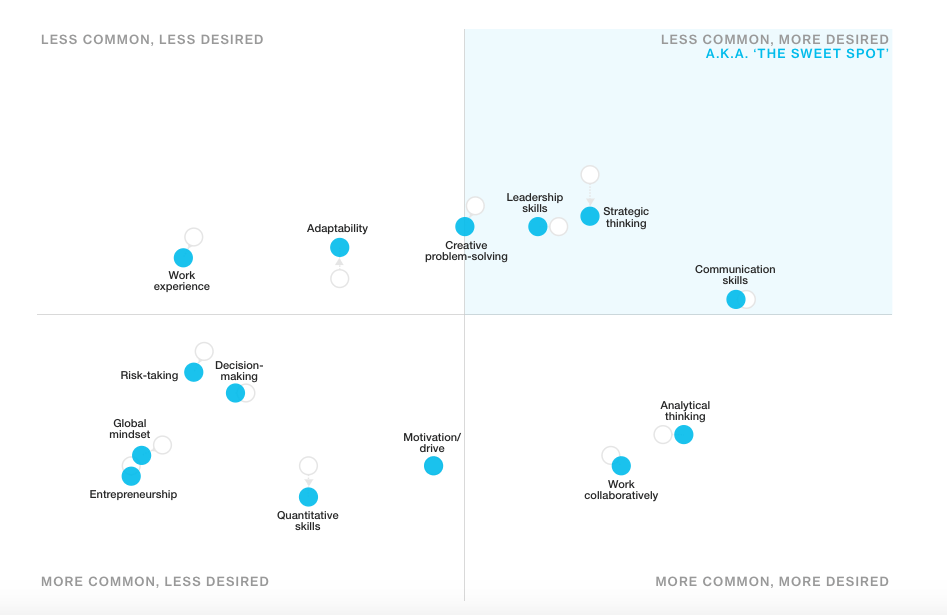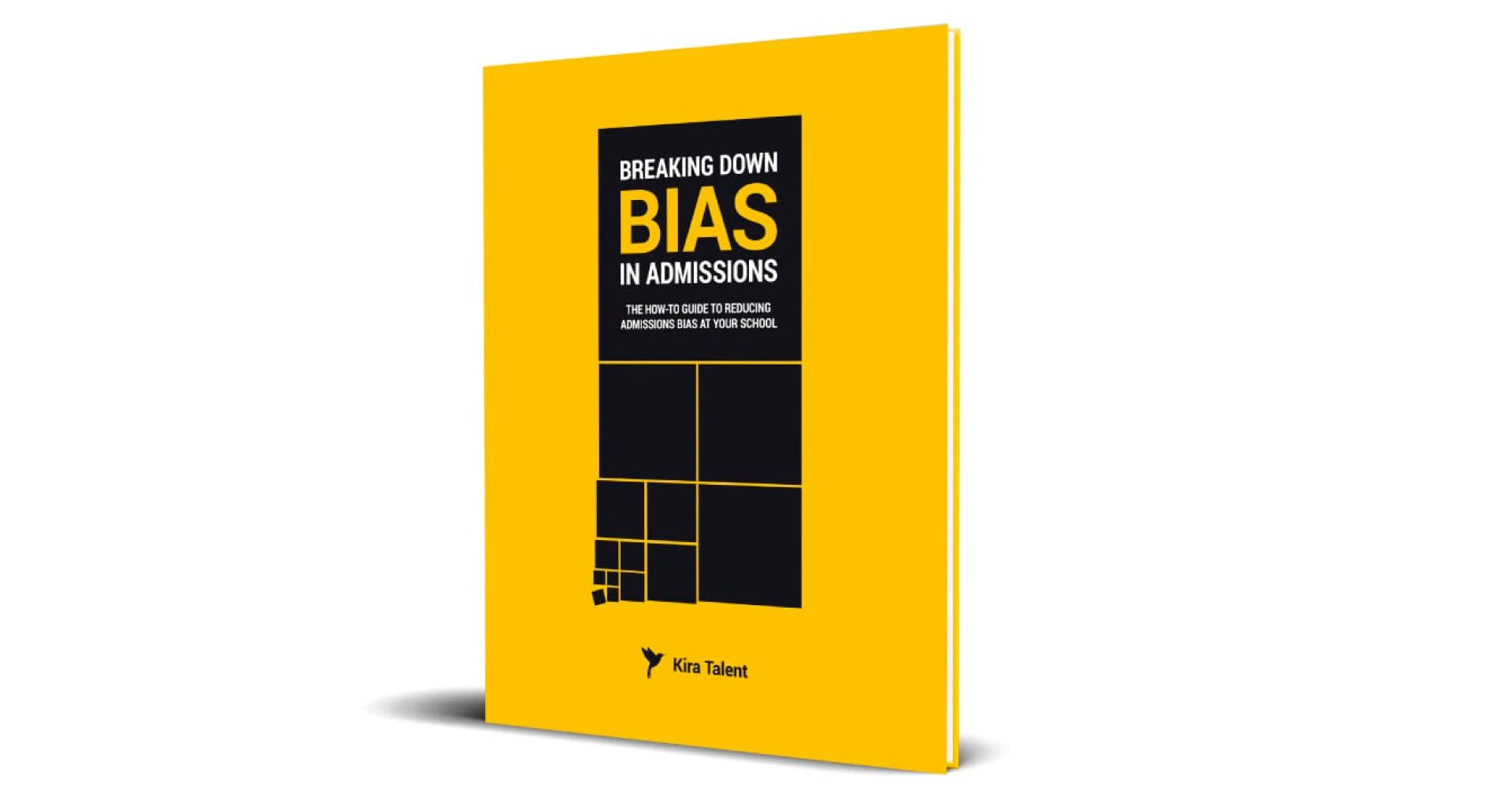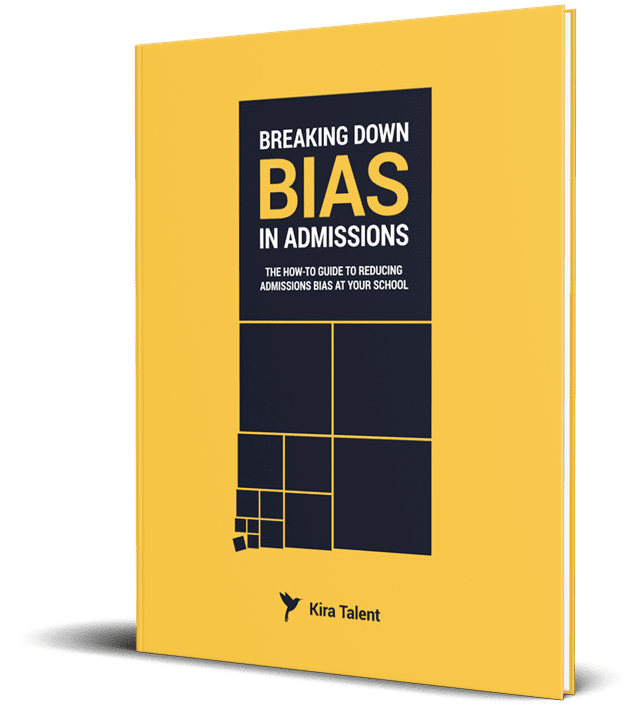However, your admissions requirements are likely vastly different than the job descriptions your future graduates are vying for.
Admitting employable students is critical for the success of your school and the health of your alumni network. Recruiters care more about the quality of your graduates than they do about the reputation of your school. However, the quality of your graduates can directly improve your school’s reputation.
When we spoke with Brandon Busteed, Executive Director of Education at Gallup, he shared a staggering statistic with us: 96 percent of academic leaders think they are doing a great job of preparing students for the workforce, yet only 11 percent of business leaders agree.
Meanwhile, in their Job Skills Report, Bloomberg asked more than 1200 recruiters at 500 companies what skills were most valued, and which were hardest to find. Four competencies fell in the sweet spot (least common, most desired): Communication skills, leadership skills, strategic thinking and creative problem-solving.

With test scores like the SAT, GRE, and GMAT serving as the keys to getting through the doors at most business schools, it seems backwards that major recruiters are reporting their most desired skills are competencies that can’t be evaluated accurately by these tests.
Across industries, 67 percent of recruiters ranked communication skills as most desirable, followed by 62 percent for analytical thinking, 56 percent for ability to work collaboratively, and 53 percent for strategic thinking.
On the contrary, only 26 percent of this same group considered quantitative skills most desirable.
Fourteen percent of survey respondents selected work experience, 11 percent selected having a global mindset, and 10 percent selected an aptitude in entrepreneurship. Yet, traditionally applicants have understood that their quantitative skills, work experience, and global exposure have been far more critical to their success in the application process and in the program itself.
How the world’s largest professional services firm hires
We contacted one of the biggest employers of today's graduates, PricewaterhouseCoopers, to ask them what they seek in new hires. The persona they’ve developed for ‘The PwC Professional’ has almost everything to do with how you work, not what you know.
PwC seeks five dimensions in their new hires: whole leadership, business acumen, technical capabilities, global acumen, and relationships. On their recruitment website, they explain: “It’s not just about your grades or how much volunteer work you’ve done. We look for a combination of attributes that we know are good indicators for your success – both now and in the future.”
When new grads go out into the world, they’re equipped with strong transcripts but lack the transferable real-world skills that employers like PwC seek. Meanwhile, PwC and organizations like it, hire candidates blatantly stating “it’s not just about your grades.”
Think applicants might be getting mixed messages?
In the current structure of schools, students continue to be pressed to score higher on exams and to compete directly with their classmates to land in the top percentile of their class.
Busteed recommends schools should change their programs to better prepare students for the workforce. Through project-based learning and the implementation of on-the-job experience opportunities like co-op and internship, adding that “when we look at college graduates [now] they are woefully inadequate in all these measures.”
“If a student goes to your institution, receives a diploma and graduates, in their mind, that’s not the ultimate outcome for them. That’s a very, very important credential, and a flag they want to knock over on their way to a more ultimate outcome, which is a good job,” Busteed said.
“A graduate who gets a diploma, but does not end up with a good job, or the job they were shooting for, doesn’t think of that as a win. Of course, every metric we use to judge higher education, somebody who completes their degree, that’s chalked up as a win.”
And so, it falls on admissions teams to find the students with the most potential to succeed and triumph in the business environment.
Identifying employability
Taking a holistic approach to admissions offers schools a wider plane on which to evaluate potential students. The Kira team works with dozens of admissions teams to help them precisely articulate the unique traits of successful students in their program and beyond.
We then use those traits, or 'competencies', to help our clients build holistic assessments on the Kira platform.
When assessing for employability, keep recruiters’ most desirable competencies top of mind. In Bloomberg’s 2016 survey, they identified communication skills, leadership skills, strategic thinking. and creative problem solving as the most desirable, least common traits in new hires.
Do you have a plan to assess these qualities in your incoming class? Here are some questions you can ask during interviews, video assessments, or essay questions.
Ask 'why'
The ability to articulate a concise, well-reasoned, and candid response to questions such as, "why are you looking to join our program at this time?" shows that your applicants have the introspective qualities and level of maturity to use their experiences in your program to 'up' their own employability. Focused drive, ambition, and motivation are great indicators of their long-term employability.
Ask 'future-based' or situational type questions
Knowing how applicants would tackle difficult hypothetical situations can give insight into how they’ll interact and problem-solve, both in the classroom and in their future places of work. As applicants describe how they would respond to various hypothetical scenarios, you can assess their strengths both identifying the challenge and formulating a solution, all the while probing for authenticity in their storytelling.
Ask 'value-based' questions
Determining the integrity of your applicants by asking value-based questions is a key way to assess their character and ethical leadership potential. Are they more concerned about winning the race or completing the whole course? Tomorrow’s business leaders have to be efficient, but they can’t cut corners when it comes to operating in an ethical and socially responsible way. You can identify students who will exemplify these values in the admissions process.
Use a 'spontaneous' assessment
Asking any of the above three types of questions on a traditional essay application, while still useful, gives the applicant weeks (or months) to prepare, edit, and get feedback and coaching on their responses. Or, in the worst case, purchase their response from an external consultant or essay service.
Posing these questions in a spontaneous assessment (in-person, phone interview, Skype, or Kira assessment) not only ensures a candid response but also gives you insight into their adaptability, strategic thinking, and creative problem solving without access to external aids. It also ensures a more level playing field among all applicants.
Evaluate verbal, written and presentation skills
Knowing that communication skills are highest ranked by recruiters, be sure to have a solid way to test an applicant’s communication skills early and effectively.
Through interviews, in-person or on the phone, or Kira assessments, you can evaluate verbal communication potential. With written essays, prepared or ‘spontaneous,’ you can see their bench strength in written communication and assess if they have the skills needed to succeed in the business world.
What have been your best essay and interview questions or assessment techniques for assessing employability? Share them with us in the comments.



